- Home
- H. Beam Piper
Uller Uprising Page 4
Uller Uprising Read online
Page 4
PROLOGUE
On Satan's Footstool
The big armor-tender vibrated, gently and not unpleasantly, as thecontragravity field alternated on and off, occasionally varying itsnormal rate of five hundred to the second when some thermal updraftlifted the vehicle and the automatic radar-altimeter control acted toalter the frequency and lower it again. Sometimes it rocked slightly,like a boat on the water, and, in the big screen which served in lieuof a window at the front of the control cabin, the dingy-yellowlandscape would seem to tilt a little. If unshielded human eyes couldhave endured the rays of Nu Puppis, Niflheim's primary, the whole scenewould have appeared a vivid Saint Patrick's Day green, the effect ofthe blue-predominant light on the yellow atmosphere. The outside'visor-pickup, however, was fitted with filters which blocked out thegamma-rays and X-rays and most of the ultra-violet-rays, and added thelonger light-waves of red and orange which were absent, so that thingslooked much as they would have under the light of a G0-type star likeSol. The air was faintly yellow, the sky was yellow with a greenishcast, and the clouds were green-gray.
A thousand feet below, the local equivalent of a forest grew, thetrees, topped with huge ragged leaves, looking like hundred-footstalks of celery. There would be animal life down there, too--littleround things, four inches across, like eight-legged crabs, gnawing atthe vegetation, and bigger things, two feet long, with articulatedshell-armor and sixteen legs, which fed on the smaller herbivores.Beyond, in the middleground, was open grassland, if one could so calla mat of wormlike colorless or pastel-tinted sprouts, and a rivermeandered through it. On the skyline, fifty miles away, was a range oflow dunes and hills, none more than a thousand feet high.
No human had ever set foot on the surface, or breathed the air, ofNiflheim. To have done so would have been instant death; the air was amixture of free fluorine and fluoride gasses, the soil was metallicfluorides, damp with acid rains, and the river was pure hydrofluoricacid. Even the ordinary spacesuit would have been no protection; theglass and rubber and plastic would have disintegrated in a matter ofminutes. People came to Niflheim, and worked the mines and uraniumrefineries and chemical plants, but they did so inside power-drivenand contragravity-lifted armor, and they lived on artificialsatellites two thousand miles off-planet. This vehicle, for instance,was built and protected as no spaceship ever had to be, completelyinsulated and entered only through a triple airlock--an outer lock,which would be evacuated outward after it was closed, a middle lockkept evacuated at all times, and an inner lock, evacuated into theinterior of the vehicle before the middle lock could be opened.Niflheim was worse than airless, much worse.
The chief engineer sat at his controls, making the minor lateraladjustments in the vehicle's position which were not possible to theautomatic controls. One of the radiomen was receiving from the orbitalbase; the other was saying, over and over, in an exasperatedlypatient voice: "Dr. Murillo. Dr. Murillo. Please come in, Dr.Murillo." At his own panel of instruments, a small man with grizzledblack hair around a bald crown, and a grizzled beard, chewed nervouslyat the stump of a dead cigar and listened intently to what was--or forwhat wasn't--coming in to his headset receiver. A couple of assistantschecked dials and refreshed their memories from notebooks and peeredanxiously into the big screen. A large, plump-faced, young man insoiled khaki shirt and shorts, with extremely hairy legs, was doodlingon his notepad and eating candy out of a bag. And a black-haired girlin a suit of coveralls three sizes too big for her, and, apparently,not much of anything else, lounged with one knee hooked over herchair-arm, staring into the screen at the distant horizon.
"Dr. Murillo. Dr. Mur--" The radioman broke off in mid-syllable andlistened for a moment. "I hear you, doctor, go ahead." Then, a momentlater "What's your position, now, doctor?"
"I can see them," the girl said, lifting a hand in front of her. "Attwo o'clock, about one of my hand's-breadths above the horizon."
The man with the grizzled beard put his face into the fur around theeyepiece of the telescopic-'visor and twisted a dial. "You have goodeyes, Miss Quinton," he complimented. "Only four personal armors;Ahmed, ask him where the fifth is."
"We only see four of your personal-armors," the radioman said. "Who'smissing, and why?" He waited for a moment, then lowered the hand-phoneand turned. "The fifth one's inside the handling-machine. One of theUllerans. Gorkrink."
The larger of the specks that had appeared on the horizon resolveditself into a handling-machine, a thing like an oversizedcontragravity-tank, with a bulldozer-blade, a stubby derrick-boominstead of a gun, and jointed, claw-tipped arms to the sides. Thesmaller dots grew into personal armor--egg-shaped things that sproutedarms and grab-hooks and pushers in all directions. The man with thegrizzled beard began talking rapidly into his hand-phone, then hung itup. There was a series of bumps, and the armor-tender, weightless oncontragravity, shook as the handling-machine came aboard.
"You ever see any nuclear bombing, Miss Quinton?" the young man withthe hairy legs asked, offering her his candy bag.
"Only by telecast, back Sol-side," she replied, helping herself."Test-shots at the Federation Navy proving-ground on Mars. I nevereven heard of nuclear bombs being used for mining till I came here,though."
"Well, if this turns out as well as the other job, three months ago,it'll be something to see," he promised. "These volcanoes have beendormant for, oh, maybe as long as a thousand years; there ought to bea pretty good head of gas down there. And the magma'll be thick,viscous stuff, like basalt on Terra. Of course, this won't be anythinglike basalt in composition--it'll be intensely compressed metallicfluorides, with a very high metal-content. The volcanoes we shot threemonths ago yielded a fine flow of lava with all sorts ofmetals--nickel, beryllium, vanadium, chromium, indium, as well ascopper and iron."
"What sort of gas were you speaking about?" she asked.
"Hydrogen. That's what's going to make the fireworks; it combinesexplosively with fluorine. The hydrogen-fluorine combination is whatpasses for combustion here; the result is hydrofluoric acid, thelocal equivalent of water. See, the metallic core of this planet iscovered, much less thickly than that of Terra, with fluoriderock--fluorspar, and that sort of thing. There's nothing like granitehere, for instance. That's why those big dunes, out there, are thebest Niflheim has in the way of mountains. The subsurface hydrogen isproduced when the acid filters down through the rock, combines withpure metals underneath."
"Dr. Murillo's inside, now," the radioman said. "Just came out of theinner airlock. He'll be up as soon as he gets out of hispressure-suit."
"As soon as he gets here, I'll touch it off," the bearded man said."Everything set, de Jong?"
"Everything ready, Dr. Gomes," one of his assistants assured him.
The door at the rear of the control-cabin opened, and Juan Murillo,the seismologist, entered, followed by an assistant. Murillo was a bigman, copper-skinned, barrel-chested; he looked like a third-orfourth-generation Martian, of Andes Indian ancestry. He came forwardand stood behind Gomes' chair, looking down at the instruments. Hisassistant stopped at the door. This assistant was not human. He was abiped, vaguely humanoid, but he had four arms and a face like alizard's, and, except for some equipment on a belt, he was entirelynaked.
He spoke rapidly to Murillo, in a squeaking jabber. Murillo turned.
"Yes, if you wish, Gorkrink," he said, in theEnglish-Spanish-Afrikaans-Portuguese mixture that was Sixth Century,A.E., Lingua Terra. Then he turned back to Gomes as the Ulleran satdown in a chair by the door.
"Well, she's all yours, Lourenco, shoot the works."
Gomes stabbed the radio-detonator button in front of him. A voice cameout of the PA-speaker overhead: "In sixty seconds, the bombs will bedetonated ... thirty seconds ... fifteen seconds ... ten seconds ...five seconds, four seconds, three seconds, two seconds, onesecond...."
Out on the rolling skyline, fifty miles away, a lancelike ray ofblue-white light shot up into the gathering dusk--a clump of fiverays, really, from five deep shafts in an irregul
ar pentagon half amile across, blended into one by the distance. An instant later, therewas a blinding flash, like sheet-lightning, and a huge ball ofvaricolored fire belched upward, leaving a series of smoke-rings tofloat more slowly after it. That fireball flattened, then spread toform the mushroom-head of a column of incandescent gas that mounted toovertake it, engorging the smoke-rings as it rose, twisting, writhing,changing shape, turning to dark smoke in one moment and belching flameand crackling with lightning the next. The armor-tender began to pitchand roll; it was all the engineer and one of the assistants could do,together, to keep it level.
"In about half an hour," the large young man told the girl, "the realfireworks should be starting. What's coming up now is just smalldebris from the nuclear blast. When the shockwaves get down far enoughto crack things open, the gas'll come up, and then steam and ash, andthen the magma. This one ought to be twice as good as the one we shotthree months ago; it ought to be every bit as good as Krakatoa, onTerra, in 59 Pre-Atomic."
"Well, even this much was worth staying over for," the girl said,watching the screen.
"You going on to Uller on the _City of Canberra_?" Lourenco Gomesasked. "I wish I were; I have to stay over and make another shot, in amonth or so, and I've had about all of Niflheim I can take, now. Thesooner I get onto a planet where they don't ration the air, the betterI'll like it."
"Well, what do you know!" the large young man with the hairy legsmock-marveled. "He doesn't like our nice planet!"
"Nice planet!" Gomes muttered something. "They call Terra God'sFootstool; well, I'll give you one guess who uses this thing to prophis cloven hoofs on."
"When are you going to Terra?" the girl asked him.
"Terra? I don't know, a year, two years. But I'm going to Uller on thenext ship--the _City of Pretoria_--if we get the next blast off intime. They want me to design some improvements on a couple ofpower-reactors, so I'll probably see you when I get there."
"Here she comes!" the chief engineer called. "Watch the base of thecolumn!"
The pillar of fiery smoke and dust, still boiling up from where thebombs had gone off far underground, was being violently agitated atthe bottom. A series of new flashes broke out, lifting and spreadingthe incandescent radioactive gasses, and then a great gush of flamerose. A column of pure hydrogen must have rushed up into the vacuumcreated by the explosion; the next blast of flame, in a lateral sheet,came at nearly ten thousand feet above the ground, and great rags offire, changing from red to violet and back through the spectrum to redagain, went soaring away to dissipate in the upper atmosphere. Thengeysers of hot ash and molten rock spouted upward; some of thewhite-hot debris landed almost at the acid river, half-way to thearmor-tender.
"We've started a first-class earthquake, too," the Hispano-IndianMartian Murillo said, looking at the instruments. "About six bigcracks opening in the rock-structure. You know, when this quiets downand cools off, we'll have more ore on the surface than we can handlein ten years, and more than we could have mined by ordinary means infifty."
About four miles from the original blast, another eruption began witha terrific gas-explosion.
"Well, that finishes our work," the large young man said, going to akitbag in the corner of the cabin and getting out a bottle. "Get someof those plastic cups, over there, somebody; this one calls for adrink."
"That's right," Gomes said. "You do something once, it may be anaccident; you repeat the performance, and it's a success." He beganpushing papers aside on his desk, and the girl in the too-amplecoveralls brought drinking cups.
The Ulleran, in the background, rose quickly and squeakedapologetically. Murillo nodded. "Yes, of course, Gorkrink. No need foryou to stay here." The Ulleran went out, closing the door behind him.
"That taboo against Ullerans and Terrans watching each other eat anddrink," Murillo said. "What is that, part of their religion?"
"No, it's their version of modesty," the girl replied. "Like some ofour sex-inhibitions, which they can't even begin to understand.... Butyou were speaking to him in Lingua Terra; I didn't know any of themunderstood it."
"Gorkrink does," Murillo said, uncorking the bottle and pouring intothe plastic cups. "None of them can speak it, of course, because ofthe structure of their vocal organs, any more than we can speak theirlanguages without artificial aids. But I can talk to him in LinguaTerra without having to put one of those damn gags in my mouth, and hecan pass my instructions on to the others. He's been a big help; I'llbe sorry to lose him."
"Lose him?"
"Yes, his year's up; he's going back to Uller on the _Canberra_. Youknow, it's impossible to keep some trace of fluorine from the air inthe handling-machines, or even out on the orbiters, and it plays thedevil with their lungs. He wanted to stay on another three months, tohelp with the next shot, but the medics wouldn't hear of it.... He'sfrom Keegark, wherever on Uller that is; claims to be a prince, orsomething. I know all the other geeks kowtow to him. But he's a damngood worker. Very smart; picks things up the first time you tell him.I'll recommend him unqualifiedly for any kind of work withcontragravity or mechanized equipment."
They all had drinks, now, except the chief engineer, who wanted arain-check on his.
"Well, here's to us," Murillo said. "The first A-bomb miners inhistory...."

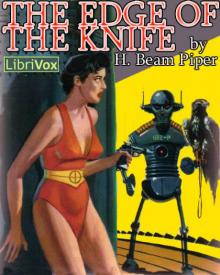 The Edge of the Knife
The Edge of the Knife Genesis
Genesis A Slave is a Slave
A Slave is a Slave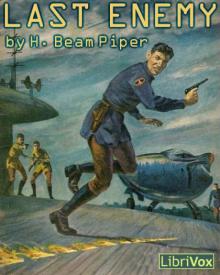 Last Enemy
Last Enemy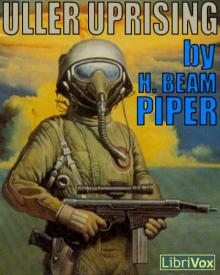 Uller Uprising
Uller Uprising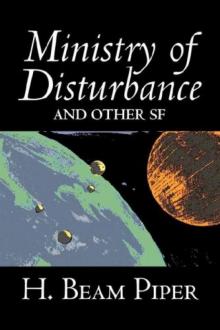 Ministry of Disturbance
Ministry of Disturbance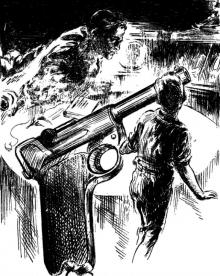 Time and Time Again
Time and Time Again The Mercenaries
The Mercenaries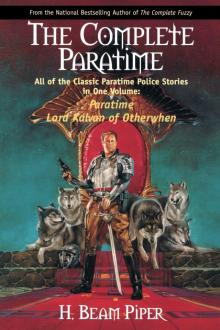 Police Operation
Police Operation He Walked Around the Horses
He Walked Around the Horses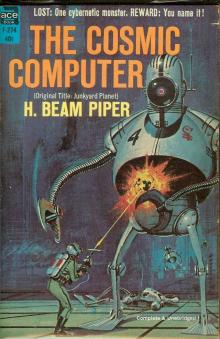 Time Crime
Time Crime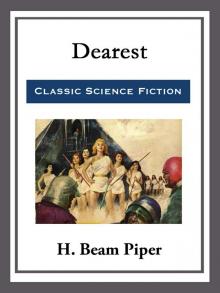 Dearest
Dearest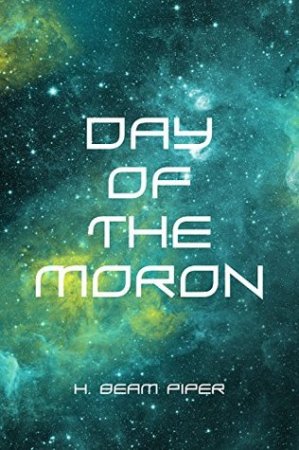 Day of the Moron
Day of the Moron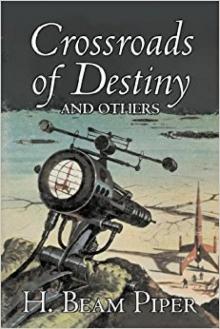 Crossroads of Destiny
Crossroads of Destiny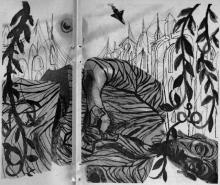 Graveyard of Dreams
Graveyard of Dreams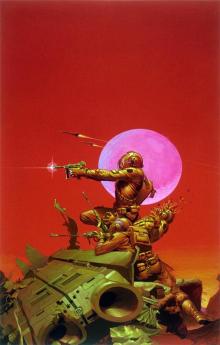 The Cosmic Computer
The Cosmic Computer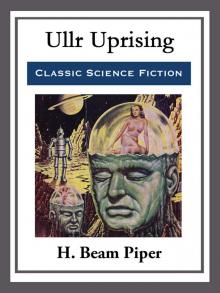 Ullr Uprising
Ullr Uprising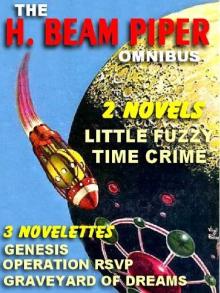 Operation R.S.V.P.
Operation R.S.V.P.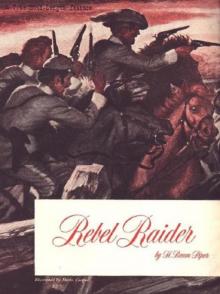 Rebel Raider
Rebel Raider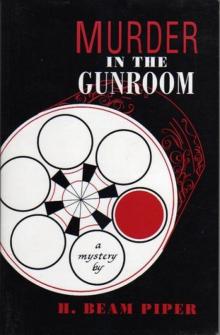 Murder in the Gunroom
Murder in the Gunroom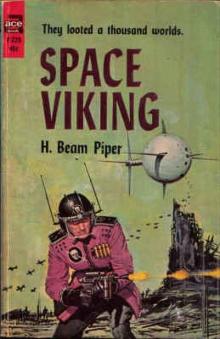 Space Viking
Space Viking The Answer
The Answer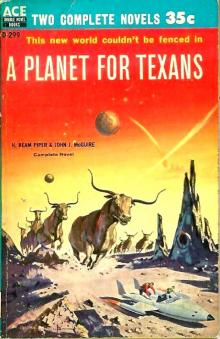 A Planet for Texans (aka Lone Star Planet)
A Planet for Texans (aka Lone Star Planet)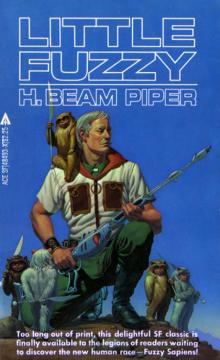 Little Fuzzy
Little Fuzzy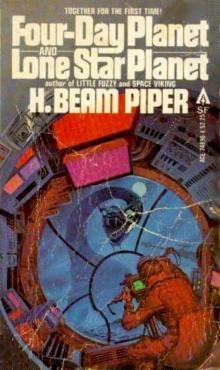 Four-Day Planet
Four-Day Planet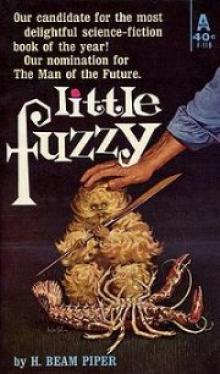 Little Fuzzy f-1
Little Fuzzy f-1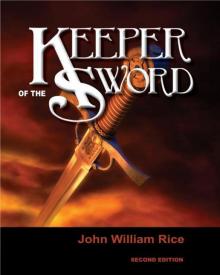 Keeper
Keeper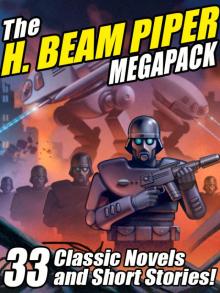 The H. Beam Piper Megapack
The H. Beam Piper Megapack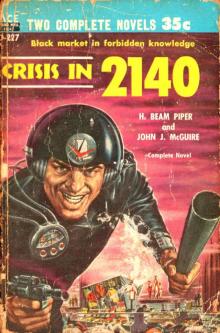 H. Beam Piper
H. Beam Piper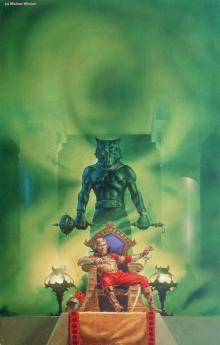 Lord Kalvan of Otherwhen
Lord Kalvan of Otherwhen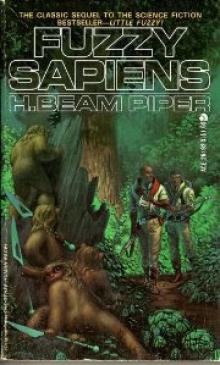 Fuzzy Sapiens f-2
Fuzzy Sapiens f-2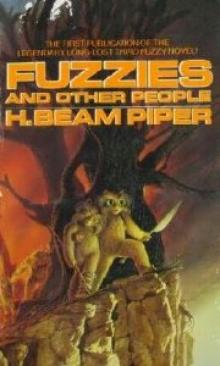 Fuzzies and Other People f-3
Fuzzies and Other People f-3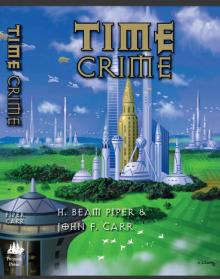 TIME PRIME
TIME PRIME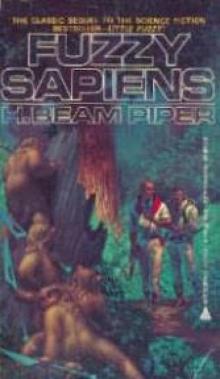 Fuzzy Sapiens
Fuzzy Sapiens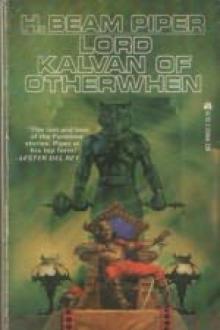 Lord Kalvan of Otherwhen k-1
Lord Kalvan of Otherwhen k-1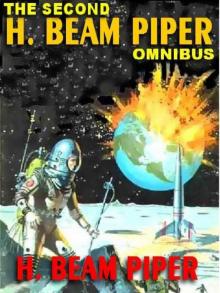 The Second H. Beam Piper Omnibus
The Second H. Beam Piper Omnibus